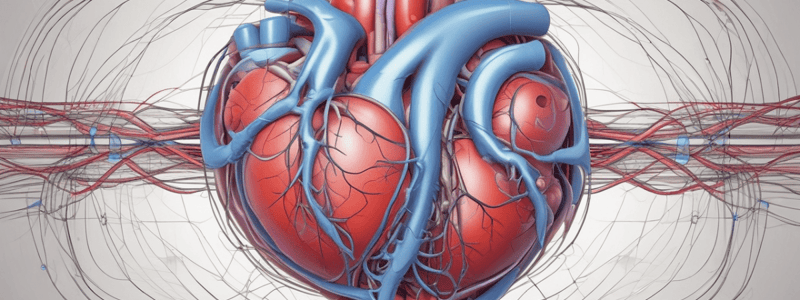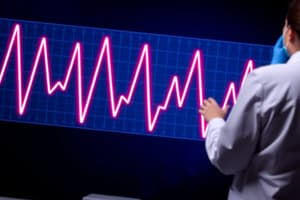Podcast
Questions and Answers
What is the approximate heart rate of a small animal like a mouse?
What is the approximate heart rate of a small animal like a mouse?
- 20 bpm
- 600 bpm (correct)
- 60 bpm
- 80 bpm
According to the graph, how long should humans live based on their heart rate?
According to the graph, how long should humans live based on their heart rate?
- 60-70 years
- 80-90 years
- 40-50 years
- 20-25 years (correct)
What is the predicted age of reproduction based on the graph?
What is the predicted age of reproduction based on the graph?
- 20 years
- 18 years
- 13 years (correct)
- 10 years
What is the advantage of having grandparents in an evolutionary context?
What is the advantage of having grandparents in an evolutionary context?
Why do humans live longer than predicted by the graph?
Why do humans live longer than predicted by the graph?
What is the approximate heart rate of a large animal like a whale?
What is the approximate heart rate of a large animal like a whale?
What happens to older animals in a herd or pack?
What happens to older animals in a herd or pack?
What is the purpose of grandparents in an evolutionary context?
What is the purpose of grandparents in an evolutionary context?
What is the approximate number of heartbeats in a lifetime for most animals?
What is the approximate number of heartbeats in a lifetime for most animals?
According to the lecture, why do zebras not typically get chronic kidney failure?
According to the lecture, why do zebras not typically get chronic kidney failure?
What is the approximate number of heartbeats in a human lifetime?
What is the approximate number of heartbeats in a human lifetime?
What is the primary reason for the increase in chronic diseases in humans?
What is the primary reason for the increase in chronic diseases in humans?
What is the main point of the graph showing the number of heartbeats in a lifetime?
What is the main point of the graph showing the number of heartbeats in a lifetime?
According to the lecture, what is the approximate age range during which humans are likely to develop chronic diseases?
According to the lecture, what is the approximate age range during which humans are likely to develop chronic diseases?
What can be inferred about the way we deal with chronic diseases?
What can be inferred about the way we deal with chronic diseases?
What is the implication of humans living longer than we were 'designed' to?
What is the implication of humans living longer than we were 'designed' to?
What is the normal conductor of the orchestra setting the heart rate?
What is the normal conductor of the orchestra setting the heart rate?
What happens when the cardiac structures start firing off at faster rates or at abnormal intervals?
What happens when the cardiac structures start firing off at faster rates or at abnormal intervals?
Where is the sinus node located?
Where is the sinus node located?
What is the composition of the sinus node?
What is the composition of the sinus node?
What percentage of the sinus node is composed of connective tissue?
What percentage of the sinus node is composed of connective tissue?
What are the 'P' cells in the centre of the SA node described as?
What are the 'P' cells in the centre of the SA node described as?
What is a characteristic feature of the 'P' cells in the centre of the SA node?
What is a characteristic feature of the 'P' cells in the centre of the SA node?
What is the effect of aging on the heart rate due to changes in the sinus node?
What is the effect of aging on the heart rate due to changes in the sinus node?
What does a change in the ST segment of an ECG indicate?
What does a change in the ST segment of an ECG indicate?
What is the QT interval a useful index of?
What is the QT interval a useful index of?
What is the chronological state of the heart modulated by?
What is the chronological state of the heart modulated by?
What is the function of the vagus nerve in heart rate regulation?
What is the function of the vagus nerve in heart rate regulation?
What is the primary pacemaker of the heart?
What is the primary pacemaker of the heart?
What is the diagnostic significance of a prolonged QT interval?
What is the diagnostic significance of a prolonged QT interval?
What is the sympathetic nervous system's effect on heart rate?
What is the sympathetic nervous system's effect on heart rate?
What is the relationship between the QT interval and the ventricular action potential duration?
What is the relationship between the QT interval and the ventricular action potential duration?
What is the primary function of the AV node in regulating heart rate?
What is the primary function of the AV node in regulating heart rate?
What is the benefit of the AV pause in the cardiac conduction system?
What is the benefit of the AV pause in the cardiac conduction system?
What is the sequence of contraction in the ventricles during a normal heartbeat?
What is the sequence of contraction in the ventricles during a normal heartbeat?
What is the role of intercalated disks in cardiac muscle fibers?
What is the role of intercalated disks in cardiac muscle fibers?
What is the significance of the ventricular conduction system in regulating cardiac function?
What is the significance of the ventricular conduction system in regulating cardiac function?
What is the result of the rapid conduction of electrical impulses down the septum to the apex of the ventricle?
What is the result of the rapid conduction of electrical impulses down the septum to the apex of the ventricle?
What is the mechanism by which electrical impulses spread through cardiac muscle fibers?
What is the mechanism by which electrical impulses spread through cardiac muscle fibers?
What is the purpose of the slow conduction through the AV node?
What is the purpose of the slow conduction through the AV node?
Study Notes
Heart Rate and Life Expectancy
- A linear relationship exists between heart rate and life expectancy in various animals, but humans deviate from this trend.
- Smaller animals (e.g., mice) have faster heart rates (~600 bpm) and shorter lifespans (~2 years), while larger animals (e.g., whales) have slower heart rates (~20 bpm) and longer lifespans (~40 years).
- Humans have a resting heart rate of ~72 bpm and live up to ~80 years, which is inconsistent with the expected trend.
The Advantage of Grandparents
- In evolutionary terms, it's unclear what advantage grandparents provide, as they may become a liability in terms of resource consumption and slowing down the pack/herd.
- However, in social animals like humans, grandparents may offer benefits through sharing their experience and knowledge.
Chronic Diseases
- The period from ~20-25 years of age to ~80 years is a timeframe where humans are more susceptible to chronic diseases, as they were not "designed" to live this long.
- Chronic diseases, such as diabetes, cardiovascular disease, cancer, and dementia, are not something that human bodies have evolved to deal with.
- The way humans deal with chronic diseases may be inappropriate.
Heartbeats in a Lifetime
- All animals have approximately the same number of heartbeats in a lifetime (~3 x 10^8 heartbeats).
- The rate at which heartbeats are used can vary greatly, with some animals (e.g., mice) using them quickly and others (e.g., whales) using them more slowly.
The Sinus Node
- The sinus node is the primary pacemaker, located at the top of the right atrium, and is responsible for setting the heart rate.
- The sinus node contains a mixture of specialized nodal cells, atrial cells, and connective tissue, which is essential for its normal functioning.
- Changes to the sinus node structure with age contribute to aging-induced changes in heart rate.
The AV Node
- The AV node filters out high frequencies, preventing the transmission of high heart rates from the atria to the ventricles.
- The AV pause allows time for the ventricles to fill before they contract and prevents the transmission of high heart rates.
Conduction and Contraction
- The ventricular conduction system is very fast, allowing the sequence of contraction to start at the apex of the ventricle and push blood up towards the outflow tracts.
- The conduction of excitation spreads from cell to cell along the length of cardiac fibers, facilitated by intercalated disks.
ECG and Myocardial Ischaemia
- Changes in the ST segment of the ECG can indicate myocardial ischaemia or an evolving myocardial infarction.
- The QT interval is a useful index of action potential duration and can be diagnostic of potentially lethal genetic channelopathies, such as Long QT Syndrome.
Studying That Suits You
Use AI to generate personalized quizzes and flashcards to suit your learning preferences.
Description
Learn about the normal functioning of the cardiac conduction system, including the sinus node, and how abnormalities can lead to cardiac arrhythmias. Understand how the sinus node regulates the heart rate and what happens when the normal rhythm is disrupted.




